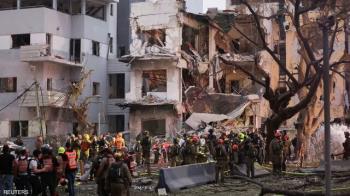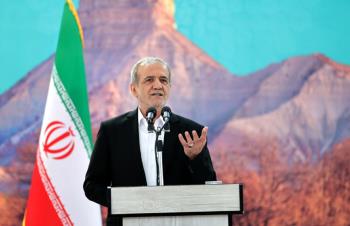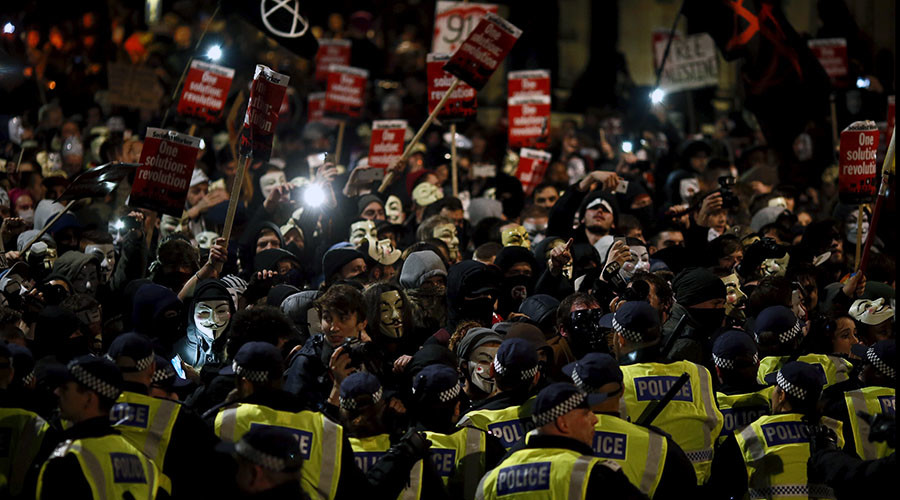Alwaght- Europe is facing rising tensions among high ranking officials coupled with a surge in street protests by enraged masses.
Recently, Germany warned Britain to stop stalling the process of leaving the European Union, commonly referred to as Brexit.
"We need to ensure that the talks begin quickly even if the court decided this week that the British parliament must be consulted. Further delay isn't in anyone's interests," Germany’s Foreign minister Steinmeier said after meeting British Foreign Secretary Boris Johnson in Berlin on Friday. France has also expressed dissatisfaction over Britain's procrastination in negotiating its exit from the European Union.
EU leaders have also been bickering over the creation of a continental army which will now be a priority after Donald Trump's shock victory in the US elections.
The European Commission president Europe said on Thursday the EU should build its own army and not rely on security guarantees from Washington. Speaking in Berlin, Jean-Claude Juncker said, "We need more security in Europe, and I do not mean just the anti-terror fight. Talking about security we need a different way of organizing a European defense."
At a meeting in Bratislava, Slovakia, on September 16, EU leaders—minus Britain—agreed on a timeline for developing this military cooperation. The European Commission will put forward concrete proposals in December, and governments will aim to form an agreement by June.
The meeting seemed like a success, but the conference ended on a sour note of failure. The French, Italian and German leaders had planned to put on a united front with a joint press conference. But Italian Prime Minister Matteo Renzi pulled out. “I cannot hold a press conference with [German Chancellor Angela] Merkel and [French President François] Hollande if I don’t agree with their positions on immigration and the economy,” he said.
Italy was not the only critic. Hungarian Prime Minister Viktor Orbán called the bloc’s migration policy “self-destructive and naive.” And this came after European Council President Donald Tusk called Orbán and Polish Prime Minister Beata Szydło aside and asked them to be less critical of Brussels.
Protests Rock Europe
Masses protesting various issues continue to pour over the various capitals across Europe.
On 5th November, thousands of masked people chanted “whose streets? our streets” as they walked from London's Trafalgar Square to Westminster during the Million Mask March.
The protest, which supports Anonymous, the anarchist hacking collective, coincides with Bonfire Night as people head to displays across the city – and saw 53 people arrested for drugs, offensive weapons, criminal damage, public order offenses and obstruction as they clashed with riot police. Dozens of people were arrested after they refused to remove masks for police. The annual protest is held on the same day worldwide with an agenda which is largely anti-capitalism. Ahead of the event the protest's Facebook page told people intending to join the march "the police are not your friends" and called on officers to "restrain from violence and their usual mob mentality". Meanwhile hundreds of protesters gathered outside the US embassy in London to protest against Donald Trump following his US election win, hours after the results were announced.
Cries of "Dump Trump!" erupted from a crowd of around 200, which assembled outside the iron gates patrolled by dozens of police. The protest was organized by Stand Up To Racism, a campaign group that say Mr Trump had run “the most racist election campaign in generations.”
Europe's Economy Facing Doldrums
Following Trump's victory Europe’s fragile economic recovery is now completely caught in the doldrums. On Wednesday, the European Commission published calculations for the outlook in the 19-nation euro area for slower growth in the region’s four biggest economies: Germany, Italy, Spain and France. Europe's economy faces a bleak future since after Trump is sworn in on January 20, the Trans Atlantic Trade and Investment Partnership between the U.S and European Union is likely to be undermined.
Countries seek a break from traditional powers
European countries can currently be classified into two groups; one consisting of the old traditional powers which include France, Germany and Britain and the new Europe which is composed of new countries seeking independent policies and stances. Such countries include Austria, Italy, Greece, Switzerland, Hungary, Finland, and Bosnia Herzegovina.
Meanwhile, after Britain voted to exit from the EU, faces a new challenge as Scotland has always wanted to secede from the UK is demanding more clarity on Britain's Brexit strategy.
The London-based British government began a series of meetings with Scottish, Welsh and Northern Irish devolved administrations designed to reassure them that they will have a say in shaping the country's future ties with the EU.
Speaking after the first meeting of the joint ministerial committee on EU negotiations in London, the Scottish government’s Brexit minister, Michael Russell, called on the UK government to make its intentions clearer.
Although 52 percent of Britons voted to leave the EU in June, a 62-percent majority in Scotland voted to remain, thus creating a serious challenge for the three-century old union between London and Edinburgh. Wales, like England, voted to exit and Northern Ireland voted to remain.



























